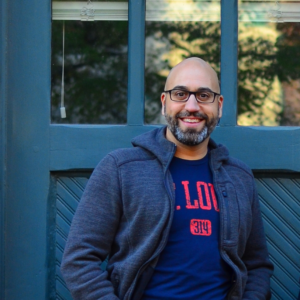
Dan Herron works in coaching, fitness consulting, and marketing for VisionQuest Labs, a startup human performance lab and cycling training center in Indianapolis, IN.
VisionQuest Labs’ metabolic tests, fitness and athletic consulting, and cycling studio can help everyone improve their fitness and performance– from beginner to elite athlete. Dan Herron has assisted with various aspects of starting this new business. He’s spent time building relationships with individual athletes, fitness studios, and companies looking to incorporate this testing into their wellness packages while also planning and coaching cycling camps and indoor structured rides. He enjoys consulting with clients on the next steps in applying the data from their assessments into their workout plans.
Dan Herron also works as one of the instructors for the new online cycling training platform, Velocity. You can learn more about VisionQuest Labs at vqlabs.com and Velocity at vqvelocity.com
In addition to his work in coaching and entrepreneurship, Dan loves competing in Ironman, endurance cycling events, and merging endurance sports with philanthropic pursuits. Dan Herron’s future plans include pursuing certifications that will enable him to provide professional coaching in triathlon and the individual disciplines of swimming, cycling, and running.
We caught up with Dan Herron where he shared details about the importance of lower intensity workouts for reaching your weight loss goals.
Oftentimes, one of our exercising tendencies is to go all out as hard as we can, to burn as many calories as possible. Working these all-out efforts into our training plans is a good idea in order to focus on expanding our anaerobic capacity and repeatability (the abilities to sustain and repeat higher power outputs, with a higher heart rate, that also requires our bodies to dip into our glycogen/sugar stores for our energy). These high intensity efforts are very helpful to our fitness development. However, it is not good to have high-intensity efforts as our constant focus.
Why not?
First, our bodies need space to recover in order to grow in strength and efficiency through the process of our bodies repairing and adapting to the higher levels of stress we’ve placed on them. If we go all out in the anaerobic zone all the time, we do not allow our bodies to repair, and thus we risk injury.
Second, always training in the anaerobic zone requires our bodies to constantly be taking in carbohydrates sufficient for all of these hard efforts. When we exercise at a heart rate above our anaerobic threshold, our bodies have stopped using fat as fuel and are in total reliance upon our glycogen/sugar stores which come through carbohydrates. And, if you’re going all out anaerobically and don’t have sufficient sugar stores/glycogen to provide energy, guess where your body turns for its energy source?– Your lean tissue.
That’s right, if you’re not properly fueled for hard anaerobic efforts, then you will end up burning through your MUSCLE. So, it’s possible that all of your hard efforts in burning calories and losing weight can actually result in you retaining fat and losing muscle!
This is a problem if you want to truly be healthy and strong. Thus, we also need to work-in lower intensity, longer sessions of aerobic exercise into our regimen so that we can both grow our cardiovascular health and train our bodies to burn fat for energy. This means that we need to have longer duration, slower, and less intense workouts in a lower heart zone to maximize fat burning!
How can you do this? Here’s a pro tip from an amateur: to help you maximize burning fat during cardio, consider tackling a LOW heart rate, slow, and long effort while in a fasted state. Meaning, get up early in the morning, don’t eat anything, and then take a good long decently-paced walk or slow ride. Remaining fasted will prevent additional glycogen building up in your muscle and liver, and as you exercise at a low aerobic intensity, your body will necessarily be using your fat stores for energy for the duration of your effort. Then, post-exercise replenish with appropriate proteins and complex carbohydrate intake to give your body enough nutrients to recover well.
To go even further, take VisionQuest Lab’s VO2 Max Test. This will tell you how big your cardiovascular engine actually is, AND this test will tell you exactly what heart rate you need to be exercising to maximize fat burning because if your goal is burning fat, then it’s likely that you’re exercising too hard.
Read more:
Dan Herron Explains the Importance of Lower Intensity Workouts to Achieve Your Weight Loss Goals
